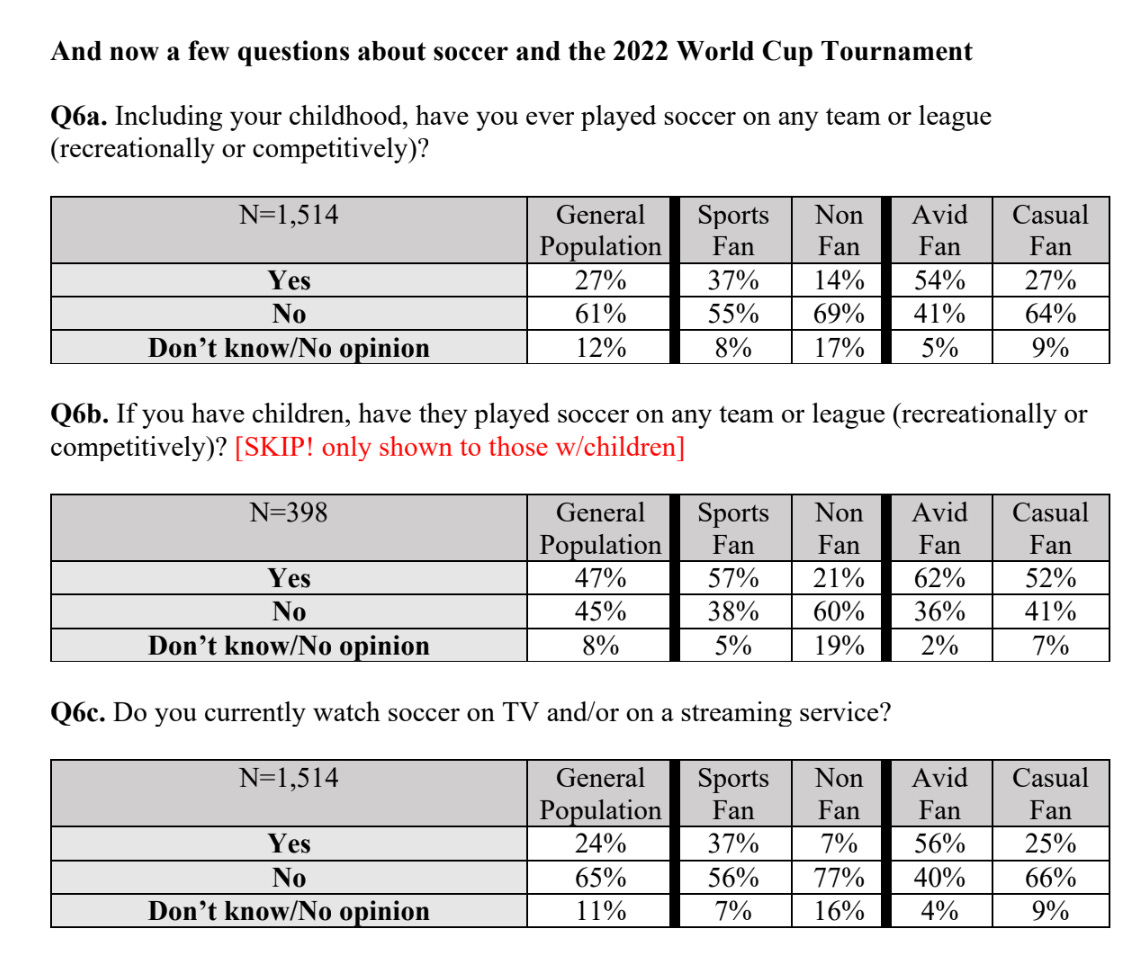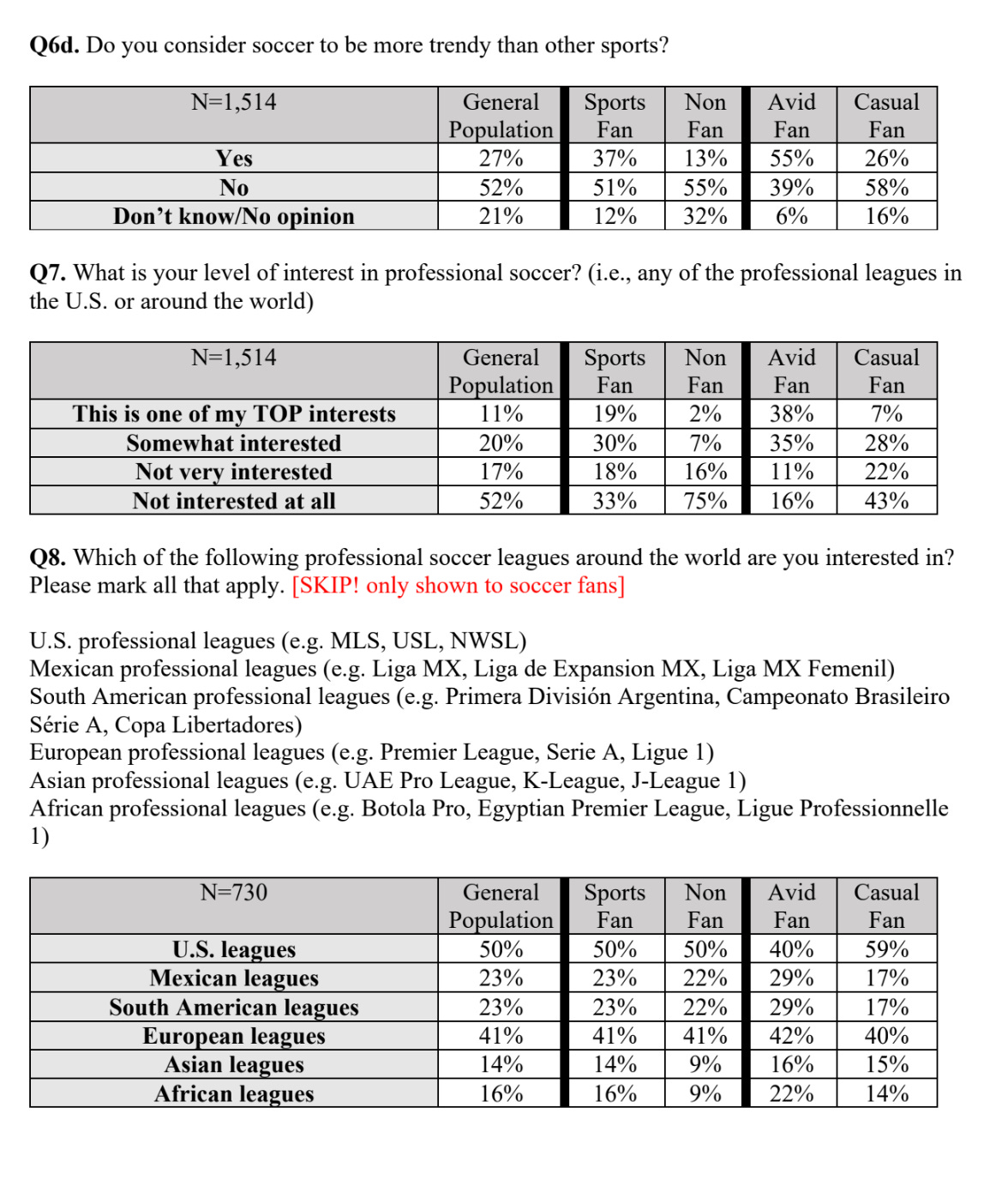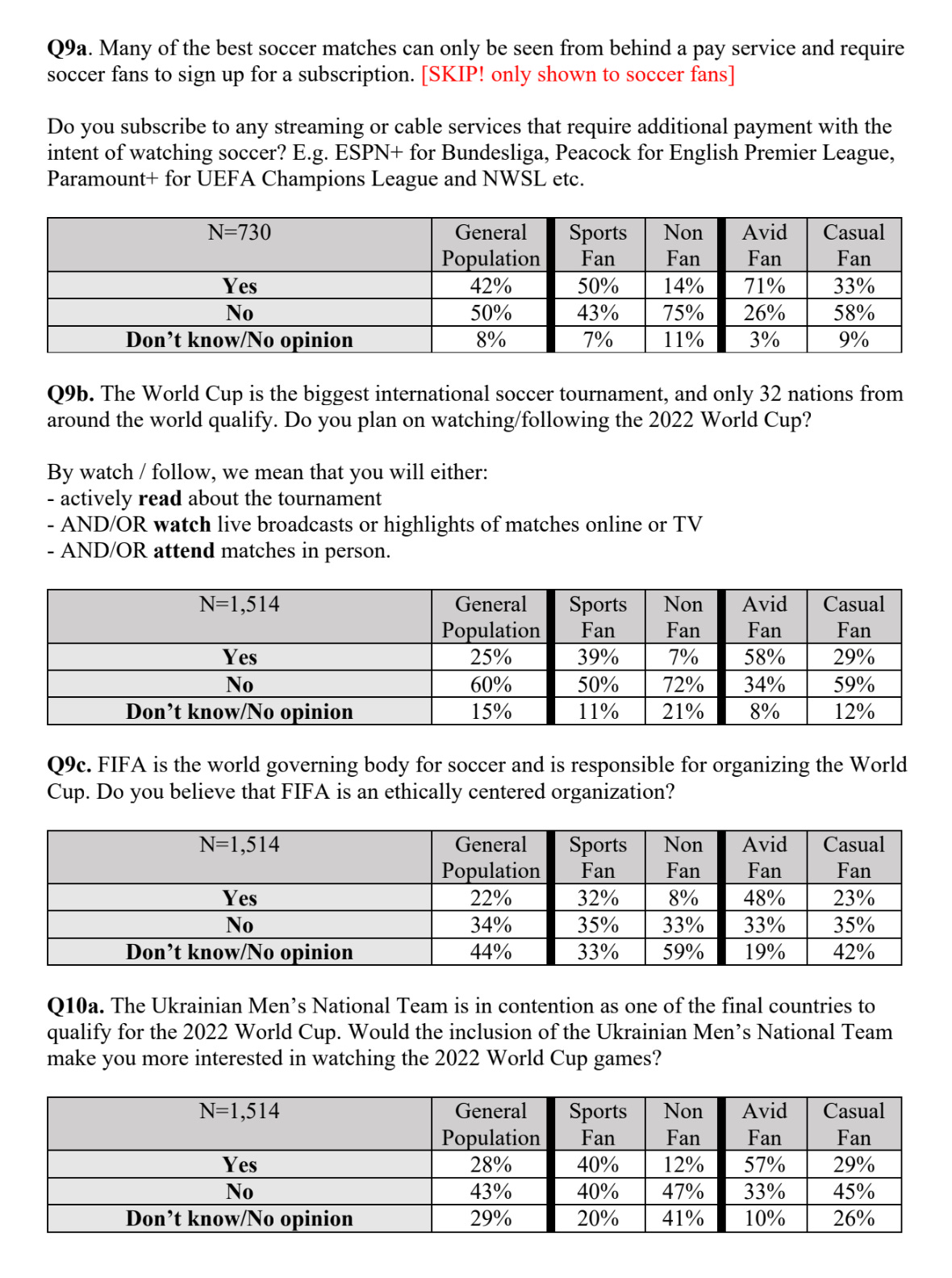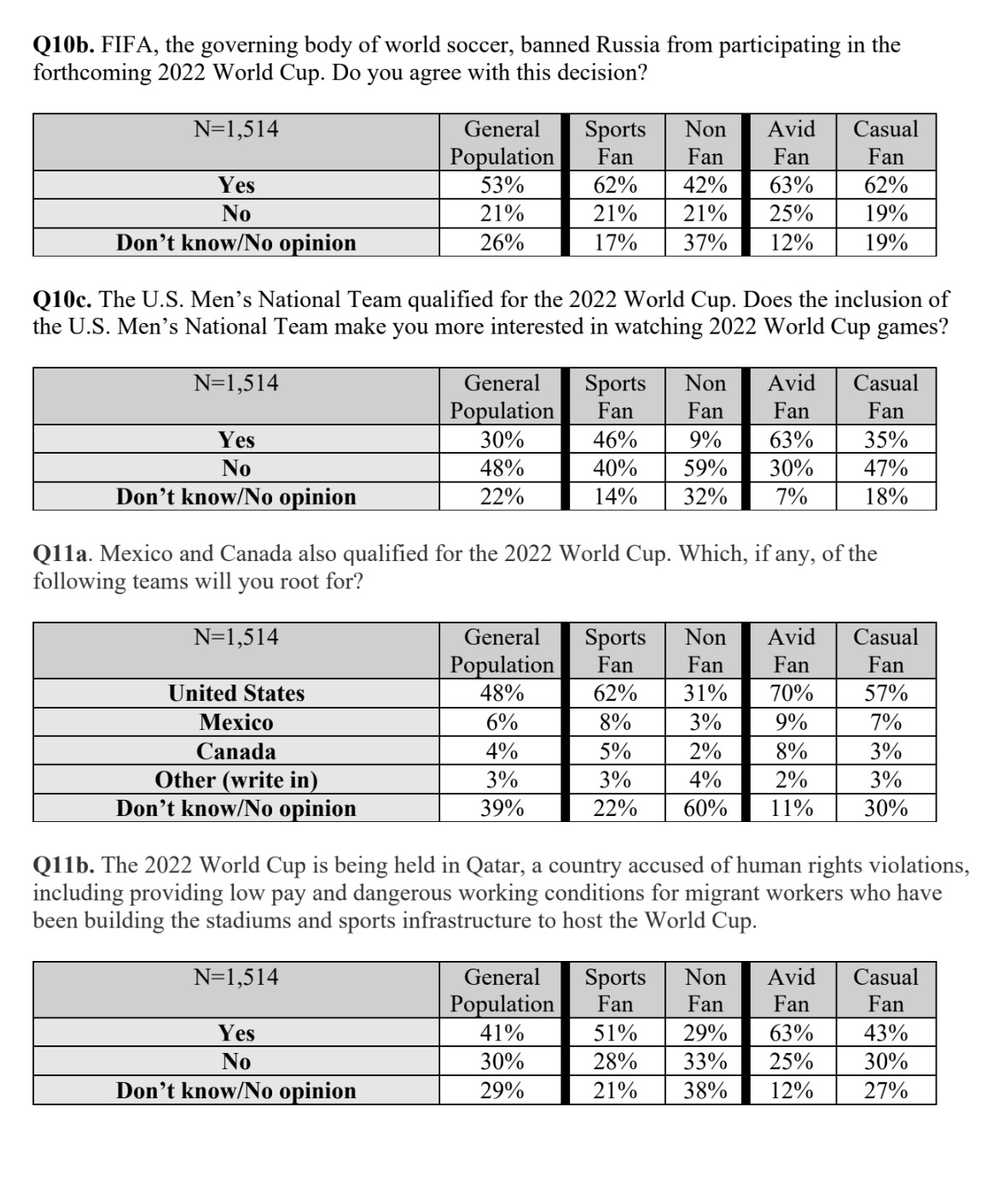The Interview: Daniel Ladik
The Seton Hall professor joins me to discuss a fascinating new scientific poll of Americans on their interest in soccer and this year's World Cup
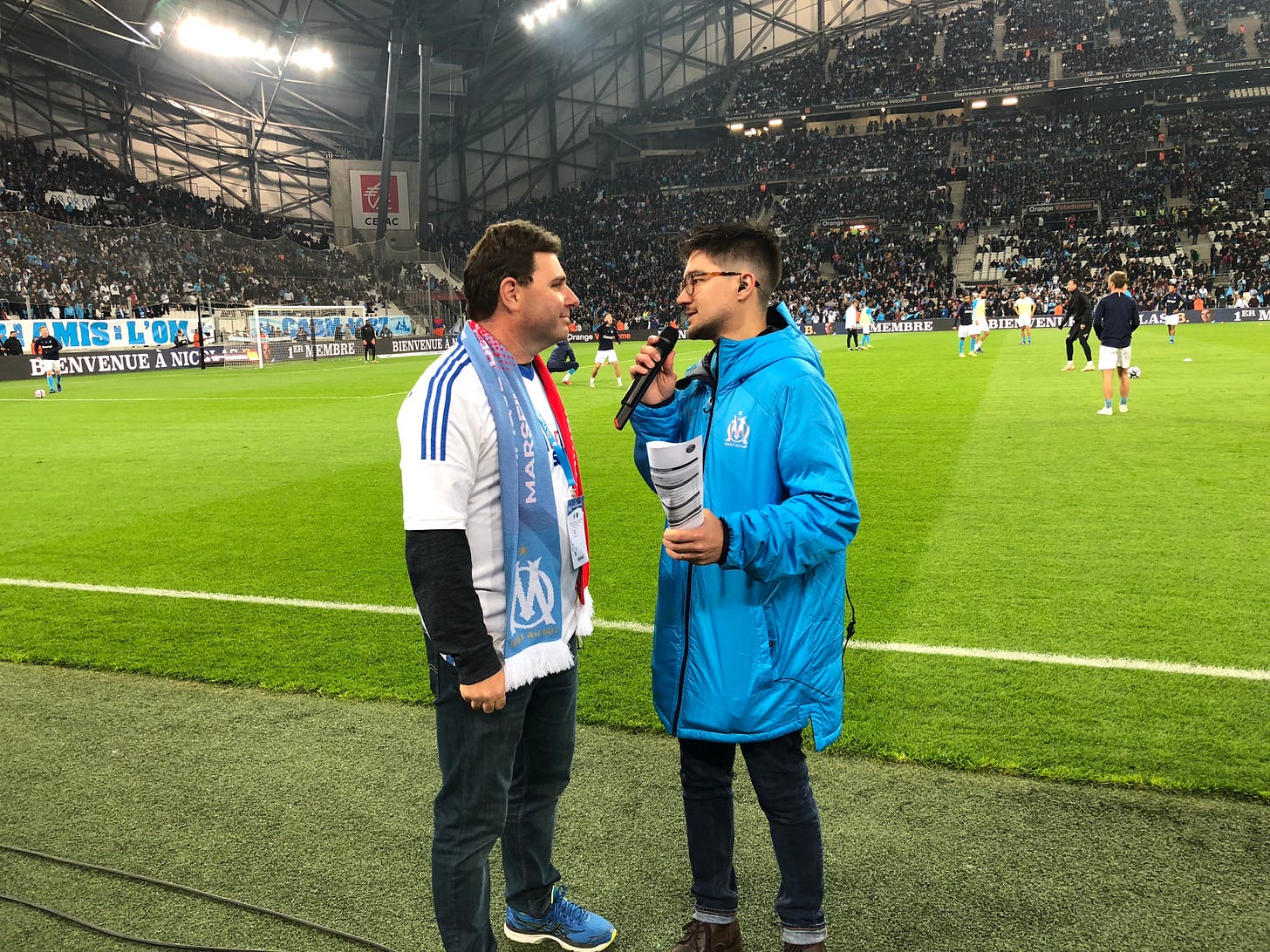
Seton Hall’s Daniel Ladik just did a really interesting scientific poll with Americans about their interest in soccer and this year’s World Cup. I spoke to him about it below and enjoyed our conversation, which I think we’ll connect for again in November when another poll comes out right before the World Cup.
The entirety of the written interview below is reserved for paid subscribers. As always, you can still get the entire free audio version of my podcast on Apple Podcasts, Spotify or wherever you like to go for your pods.
Grant Wahl:
Our guest now is Daniel Ladik, or Dr. Dan-o to his students at Seton Hall. He's an associate professor of marketing and a methodologist for the Seton Hall Sports Poll at the Stillman School of Business at Seton Hall University, where he's been for the last 11 years. Dan-o, it's great to talk to you. Thanks for coming on the show.
Daniel Ladik:
Thank you, Grant. Long-time listener, first-time caller.
Grant Wahl:
I'm really excited about this, because we're going to talk about some new polling that you just did and have been doing on soccer in the U.S., scientific polling ahead of the World Cup later this year in Qatar. But before we get into some details on that, I just want to start off by asking, what is the Seton Hall Sports Poll?
Daniel Ladik:
The Seton Hall Sports Poll is a lab in the Stillman School of Business. Our mission is what we call “concepts into practice,” which means bringing the real world into the classroom and on campus. Every one of the majors in the Stillman School has a lab. The finance department has an incredible trading room. The marketing department has a focus group room with two-way mirrors for the marketing research class, and the sports management major has the Seton Hall Sports Poll under the direction of Charlie Grantham, who's the former executive director of the NBA Players Association.
“So we asked [Americans], knowing about these human rights violations [in Qatar], does this reduce your interest in the World Cup? 41% of the general population said yes, 51% of the sports fans said yes, and 63% of avid fans said yes.” — Daniel Ladik
Grant Wahl:
And you have a soccer connection as well. You're a soccer guy. Could you explain a little bit about your soccer story?
Daniel Ladik:
I grew up playing soccer, played soccer in high school. Picked my college and I decided to call the coach, "Hey, can I try to walk on?" And he was like, "Okay." I did make it as a walk-on at St. Joseph’s University. Didn't play very much. I was young and inexperienced. Loved to play. Did not know that one of the assistant coaches was Walter Bahr of the 1950 World Cup fame that beat England. We weren't even playing in World Cups at that time, it was so long ago.
My freshman year, we played against All-American Alexi Lalas, who was a junior at the time. And yes, Rutgers beat us very well, 4-1, in which he scored a goal. He was very good then too. But I've stayed with the game. Super ecstatic that the game is so prominent now in the U.S. A big fan of European soccer in addition to the U.S., and my favorite team is Marseille. I've been to 11 games in… no, 14 games in the Velodrome.
GrantWahl.com is a reader-supported soccer newsletter. Quality journalism requires resources. The best way to support me and my work is by taking out a paid subscription now. Free 7-day trials are available.
Grant Wahl:
Nice! I mean, that's fantastic. One of the great soccer cities in the world. I haven't been there, unfortunately, since the '98 World Cup and they've totally redone the stadium since then to modernize it a bit. So I'm hoping to get back there before too long. But I find what you do fascinating and really appreciate that not too long ago you contacted me and you were about to do another edition of your sports poll looking at the World Cup and soccer in the United States.
And it was fun for me to have a little bit of influence with suggesting some potential questions, but let's get into a little bit what you've been doing with this month's new polling and over the last couple of polls.
Daniel Ladik:
Well, in March of this year, we did poll number four for the year, and I was very curious because the U.S. men's national team was on the verge of qualifying for the World Cup. They had three games left. This was before the cycle for that last [window], games 12, 13 and 14 were that week. We polled the week before that. We knew that they were probably going to get in, but you know. Well, I wanted to get a baseline number to see where the general population in the United States thought about the U.S. men's national team, and then also sports fans, in advance of the excitement level that we're probably going to see in November.
So we asked the question, the men's national team are about to qualify. Are you excited or interested in the World Cup in 2022? And then we asked it in May again and changed the question to: The team qualified. And we had a nine-point jump between March and May between people more interested in watching the World Cup after the U.S. team qualified. Let me give you the exact numbers here. In the general population the number was 21% in March. It's up to 25 in May. Amongst sports fans 34 to 39, amongst avid fans, it was 49 to 58%, so almost a nine-point jump.
Grant Wahl:
So, pretty significant. These numbers, like this is a scientific poll run the same way that political polls are run, correct?
Daniel Ladik:
That is absolutely correct. When we say it's a poll, we sampled over 1,500 people in the United States of America regardless of whether they were a sports fan or not a sports fan. They are randomly assigned. In addition, the sample mirrors the U.S. Census percentages for the U.S. for age, gender, income, education, ethnicity, and region. So all contiguous 48 states are in the sample. It is 51% female and 49% male, because that's what the U.S. Census numbers say through all the demographics.
Grant Wahl:
What were some of the things that stood out to you, I guess, the most in this poll about soccer in addition to what we've already discussed?
Daniel Ladik:
I thought one fun fact was we asked in the May poll: Ukraine’s men's national team are also close to qualifying. If they do qualify and they would be in the group with the U.S. men's national team, would you be more interested in watching the World Cup in the fall? And their numbers were the exact same as the U.S. men's national team numbers. General population, 28%, sports fans at 40%, and avid fans at 57%. I mean, they're almost exactly dead on.
Grant Wahl:
That's really interesting. And if it happens, and we'll find out in early June because the Ukraine team is going to play against Scotland, and if they win that against Wales. So one of those three teams is going to be the U.S.'s opponent on the first day of the World Cup. And I just figured that there's so much interest in Ukraine because of obviously the tragic stuff that's happening with the invasion of their country by Russia that I kind of think if Ukraine gets to the World Cup, they'd be everyone globally, their second favorite team. And it would be a really interesting sporting challenge for the United States if that were to happen.
Daniel Ladik:
On a related note to this theme, we asked if the U.S. population supported FIFA's ban of Russia in the World Cup. And yes, they did. General population was at 53%, sports fans at 62%, avid fans at also 63%. So the over-majority said, "Yeah, we're with FIFA here. They needed to be banned."
Grant Wahl:
And then one thing that I may have mentioned this to you as something I was interested in was how people in the United States view FIFA as an organization. And maybe a lot of that's tied to the 2015 U.S. government indictments that became a huge story and caused so many members of FIFA to go to court, to be convicted, to plead guilty, it caused Sepp Blatter to resign as FIFA President. But what was your sense of-
Daniel Ladik:
That started from investigations here in the United States.
Grant Wahl:
Yeah. What was your finding on that? How do Americans view FIFA as an organization?
Daniel Ladik:
The Seton Hall Sports Poll tends to query on three main areas, and ethics in sports is one of the biggest areas we query on, in addition to business and sports and culture and sports. The idea of asking if FIFA is an ethically centered organization fits perfectly with us. I'm very surprised by these numbers. They're a lot higher than I expected them. So the general population was 22% yes that FIFA is ethical, sports fans 32%, and avid fans 48%.
That means half of sports fans in the polls said, "Oh sure, FIFA is an ethically centered organization." And you and I both know that that is not the case. We should call Philippe Auclair right now and see him roll over on these numbers, to be honest with you.
Grant Wahl:
It's pretty funny. Maybe FIFA president Gianni Infantino will want to hear that. Slightly surprising there. And then there was a question for Americans about Qatar as a World Cup host, and questions about human rights with Qatar and how people in the U.S. feel about that. What did you find there?
Daniel Ladik:
So as pollsters we have to be careful not to overly bias the question. There has been a number of journalistic investigations over the past six, eight, 10 years on what's happening in Qatar related to them getting ready for the World Cup. Some really damning stories and tragic stories. I don't know if we want to go into those now or not, but we worded the question very benignly: Qatar, a country accused of human rights violations, including providing low pay and dangerous working conditions.
We did not say anything about deaths related to people working on the stadiums or the infrastructure or all the other accusations. This was a very benign question. So we asked them, you knowing about these human rights violations, does this reduce your interest in the World Cup? They were 41% of the general population said yes, 51% of the sports fans said yes, and 63% of avid fans said yes. I mean, this is a hard thing. This is the most-watched sport event in the world.
And we know how challenging the human rights situation is. Do we not watch? This is a tough thing for a fan. We know it reduces our interest, but we're probably still going to watch.
Grant Wahl:
It is interesting. I think everyone who likes to watch the World Cup or work in the World Cup or cover it as a journalist like me is asking themselves to some extent how they want to approach all of this. And what I've decided as a journalist is I am going to go to Qatar and I am going to cover the tournament, as I've covered previous World Cups. But I also went to Qatar in early March and did some journalism, which I'm going to publish on my site soon here. I already have published some.
And I just went around speaking to migrant workers because I know that I won't have the time, being busy covering soccer in November and December, to do that type of thing then. So I made sure to do it now. I feel like for me, that's how I wanted to approach it. But I do find it interesting based on what you're telling me from the poll that while Americans maybe have a slightly higher opinion of FIFA than we would've expected, that they are very aware of the human rights concerns about Qatar.
Daniel Ladik:
I think what's going to happen when we ask these exact same questions again in November where journalists like yourself and media outlets start talking more about FIFA and start talking more about Qatar, that I'm expecting to see these numbers to be more aligned with what they should be. Within the soccer community, we've been talking about this for a very long time, basically since Qatar was awarded the Cup. God knows how they were awarded the Cup, but they were awarded the Cup.
Grant Wahl:
Right. Another thing that I thought would be interesting to ask about is viewing habits, because soccer in particular in the United States over the last couple of years has become a streaming sport for viewing. Not entirely, and there are still games that take place on cable only, and there are still games occasionally that take place on free over the air television. But more and more it's on streaming. And I've been interested just in wondering how many Americans are actually doing streaming for soccer and interested in what percentage. And you got some information on that.
Daniel Ladik:
So what we did is in one question we asked what their level of soccer fandom loves. So 43% of the sample had some level of soccer interest, so that way I was able to ask specific soccer questions to that subset of 41% that are interested in soccer. So that leaves us with 730 respondents in the sample. And then we asked: Of that soccer fandom, how many of you are paying for something extra to watch soccer? And 50% of sports fans and 71% of avid fans were like, "Oh yeah, I'm paying for something over and above just to watch soccer," which given how much soccer we have on regular over the air TV or cable TV and they're still paying for something else, I think that is impressive, diehard fans here in U.S.
Grant Wahl:
That is really interesting. It kind of fits in a little bit with the overall number of Americans interested in watching professional soccer has grown over the years. But it’s always seemed to me that the level of passion within the soccer fan base in the U.S. is extremely high and they're willing to go out of their way sometimes to consume the sport.
Daniel Ladik:
It really is. As a matter of fact, that was also a question that we devised together. The fandom, these individuals that said that we are soccer fans, we then asked them which leagues do they follow or which parts of the world they follow the most. The U.S. leagues were the most popular at 50%, with European being also at 41%, but Mexico was at 23%. Really high. I was surprised that the South American leagues were also at 23%. The lowest percentages were the Asian leagues and the African leagues at 14 and 16% respectively.
Grant Wahl:
So how should we take that finding? Generally, when I see the television ratings and the audiences in the United States, the Mexican men's national team is the most popular soccer team in the United States if you look at the number of television watchers. Liga MX is the most popular domestic league on television in the United States. Now most of that is on Spanish language television, but it's in the U.S., obviously, and very popular. Does that coincide with what you're finding in your poll?
Daniel Ladik:
Well, the poll, remember, is a balanced representative sample. It's not a sample of only soccer fans. So if we were to do a poll with your viewership, or if we were to do a poll of just soccer fans in the United States, we would see numbers that would align with what we're seeing with Spanish-language soccer watching in addition to English-language soccer watching. But if we were to do a general poll of the United States, we would see subsets because I only have so many Spanish speakers in the sample here.
Grant Wahl:
And so moving forward this year, how many times are you going to be able to sort of do additional polling on some of these topics before the World Cup?
Daniel Ladik:
We're at the end of our academic year, and this is our last poll for the academic year. And I really am thankful that you were able to partner with me a little bit here to frame some of these questions, because I'm really excited. Our next poll is probably early November, probably two weeks before the World Cup. And that poll will almost be exclusively World Cup questions, but a lot of those World Cup questions will be ones that we’ve framed and got a baseline number for in May.
So I'm super excited to see what we're going to have in November to see how these numbers change. And I have a feeling they're going to go up and they're going to go up considerably. Everybody's going to be excited for the World Cup. Even casual fans watch the World Cup.
Grant Wahl:
Well, I'm obviously very fired up for it, and the months I think are going to go by quickly. It's going to be good to see the U.S. men in a World Cup again. Let's try and reconnect in November then and see how people are viewing things in the U.S. closer to the World Cup. I’d really appreciate that.
Daniel Ladik:
I would be happy to do it.
Grant Wahl:
Daniel Ladik, Dr. Dan-o to his students, is an associate professor of marketing and a methodologist for the Seton Hall Sports Poll at the Stillman School of Business at Seton Hall University. Thanks so much for coming on the show.
Daniel Ladik:
Thanks, Grant.





